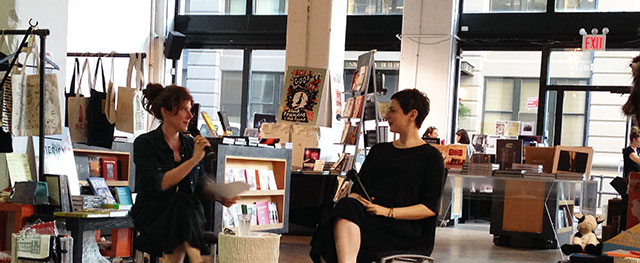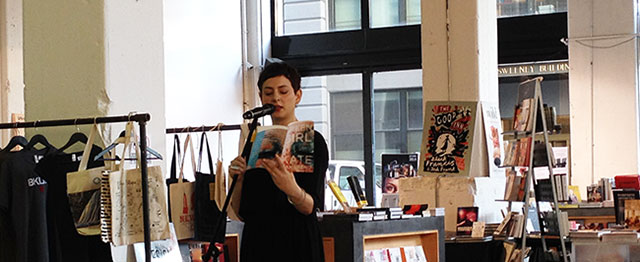
Kate Zambreno first published Green Girl three years ago through the small Emergency Press. She had the rare opportunity to revise the novel and relaunch the book to a wider audience through HarperCollins. The new edition is longer and includes an extra post-novel section as well as an original essay. She launched the new edition at Powerhouse Arena with Tin House co-founder and editor-at-large Elissa Schappell.
Green Girl began life as a small press book because Zambreno affiliated with writers, mainly poets, who produced small press books. The book began gaining broader attention and then was suddenly no longer available. Would be readers literally couldn’t find copies at stores. Zambreno describes her desire to reissue the novel as arrogance on her part, to see that it was available in bookstores and that it remained available for years. She adds that having a book in the world can be alienating though.
When Zambreno started writing, she knew nobody in the commercial publishing world. She saw herself as part of a poetry scene in Chicago. It was a very specific scene focused around Poetry Magazine. During the period, she wrote most of Green Girl and Heroines (2012). She was being rejected everywhere.
The period of rejection in a writer’s life can leave her self-conscious. Zambreno adds that she knew many friends who wrote but remained unpublished and never considered themselves writers. Heroines is about that haunting nervousness. She tells herself that many great writers never published in their lifetimes, or published only very little.
“I never combined money and writing,” she says, adding “I always identified as a poet.” She always saw herself as working and writing poetry afterward, like so many others.
Zambreno has sinced moved to New York. She’s lived in the city for a year, and says its already impacting her perspective. Money is inextricably tied to writing in New York. For poets and poetry, writing is about aesthetics, she says. She never wants to situate her writing in terms of money. What she wants is to be taken seriously as writer.
The concept of the reader moving through the work provides an important question to answer, she says, when it comes to shaping narrative. But considering the reader as a consumer is less important to her. Mainstream commercial publishing is concerned with what the reader wants. She ignores it.
“I always want to write work of tremendous feeling,” she says.
Many readers are women, she says, and in New York publishing, there is a great pressure to appeal to as many of these readers as possible. Its a way of commodifying the female writer. Being popular means being less interesting.
“The role of literature is to interrogate dominate culture,” Zambreno says. When the writer concerns herself with commodifying writing, it threatens the writer’s ability to follow through with that aim.
She also wants to interrogate power and roles of power. She says she isn’t interested in writing empowered characters, but rather, writing about desires that are not correct. Sex is a form of power. In Green Girl, Ruth never has satisfying sex. There is eroticism and desire, but that doesn’t necessarily make it satisfying sex. Zambreno says she isn’t interested in writing narratives about women running off to Italy to find orgasms.

Zambreno began writing Green Girl at twenty-four. She started by experimenting with the narrative, and the work grew from there. She played with point of view, first seeing the novel as a first person narrative and then later moving to a third person narration. The narrator though became her own kind of character within the book. Green Girl is a kind of portrait of who she was: “The book is who I was at a certain time.”
She wrote the novel when she was anonymous and nobody knew who she was. Now though she says the experience of publicity is influencing her. She thinks publicity is bad for creativity, even when its postive. Criticism and the desire of the reader begins to influence the writer, and Zambreno describes publicity as at odds with creation and destruction: “every new book has to be an act of fire, an act of rebirth.”
Eight years earlier, when Green Girl was first written, she was very interested in vanity. She has aged, perhaps even matured. Now she finds herself interested in aging and ugliness. She says she’s writing about herself as a “hag” rather than the kind of girl Ruth is.
Ultimately though, she says she still has this desire for recognition. Literary men and literary women are given different types of recognition. Literary men are taken seriously, and sometimes women aren’t. When the peers you admire end up admiring you, that’s a good sign, she says. But really, the desire for recognition can never be satisfied.